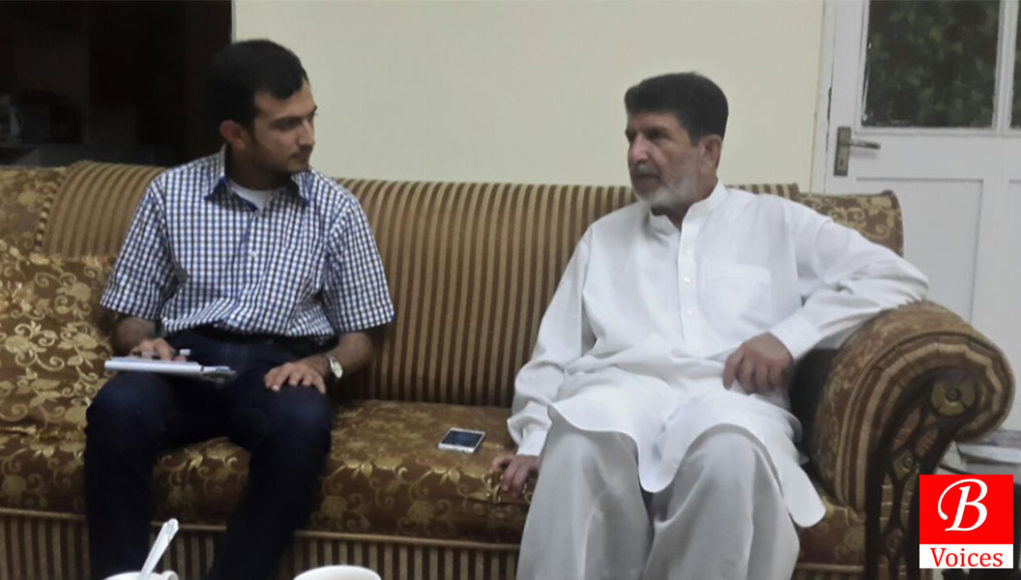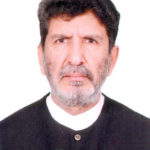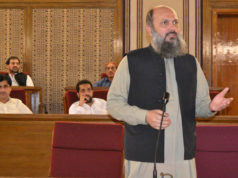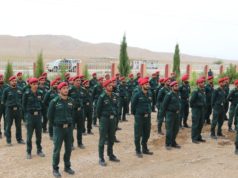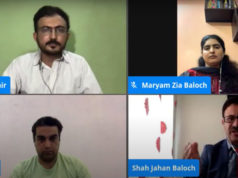Adnan Aamir
Ahmed Bakhsh Lehri is arguably the most illustrious bureaucrat from Balochistan who has served at almost all key position which a federal bureaucrat can dream about. Born in Narmuk area of Kalat district in 1954, Mr. Ahmed Bakhsh Lehri passed his matriculation exams from Government High School Mach. He then shifted to Quetta and worked on different small level jobs while privately passed Intermediate, Bachelors and Masters in English Literature exams. He joined Central Superior Services (CSS) in the year 1980 and served on many key positions such as Chief Secretary Balochistan, Secretary Establishment and Federal Secretary Education. Since his retirement in April 2014, Mr. Lehri is serving as a member of Federal Public Service Commission (FPSC).
Balochistan Voices conducted an exclusive interview with Ahmed Bakhsh Lehri in Islamabad.
Adnan Aamir: You have served in Balochistan for better part of your career. In your opinion what’s the main flaw in bureaucratic structure of Balochistan which prevents bureaucrats form delivering?
Ahmed Bakhsh Lehri: Main reason is that institutional memory is not being developed in Balochistan. Problem of Federal bureaucrats is that most of them are not from Balochistan and during their 2-3 year stint their efforts are to get transferred back to Punjab or province of their origin. So, they do not get enough time to know about Balochistan or develop sympathies for the province.
Main flaw in bureaucratic structure of Balochistan is that institutional memory is not being developed
Federal bureaucracy only has 6 percent share of Balochistan which was just 3.5 percent few years back. For one person of Balochistan appointed in DMG, 4 persons from outside are posted in Balochistan. Outsiders who are appointed in Balochistan either want to go on a course abroad or get posting in Quetta or return back to their province of origin. That’s why institutional memory does not develop in Balochistan like it does in other provinces. In Punjab and Sindh, same officers are mostly in Grade 21 and 22 who had served there since they were in Grade 17 and they are aware of the administrative issues of those provinces.
There are also provincial bureaucrats but they do not get the key posts very often. For example very few provincial services officers have been appointed as Additional Chief Secretary (ACS) Planning and Development (P&D), Secretary Home and Secretary Finance. That’s why they have a secondary role to play in the bureaucratic structure of the province.
You have served as ACS for two terms in Balochistan. In your opinion what are the flaws in the PSDP and development mechanism which does not allow the common people to benefit from the billions of development funds.
Balochistan makes up 44 percent land mass of Pakistan but only gets 9.09 percent federal funds which were just 7 percent prior to 2010. Expenses of Balochistan as an administrative unit are same as those of Punjab and Sindh. Just like Sindh and Punjab, Balochistan has a Chief Minister (CM), Governor, High Court and a Civil Secretariat and so on. As a result the non-development expenditure in the budget of Balochistan is very high. That’s why only a meager amount is reserved for development and after that the nature of allocations further thins out those funds.
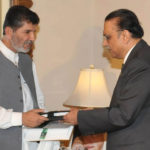
In Punjab if 100 million are spent on road constructions then a large population will benefit as compared to Balochistan where only a negligible population will benefit. That’s why the scope of development schemes is increased in Balochistan and that reduces the quality of schemes and funds get wasted as a result.
When I was ACS, I made a formula that we would do minimum development work but ensure quality. The problem with that formula was that our elected representatives were not satisfied with it. They wanted instant results and that’s why they opposed that idea.
At the time of partition, Kalat States Union formed 30 percent land mass of Pakistan and that only had one lane 90 KM fair weather road
In addition to that Balochistan was historically very backward as compared to other provinces. At the time of partition there were two parts of Balochistan; Kalat States Union and British Balochistan. In the former there were some infrastructures in form of roads, telephone line etc. However, In Kalat States Union there was only one fair weather road stretching from Quetta to Kalat. At the time of partition, Kalat States Union formed 30 percent land mass of Pakistan and that only had one lane 90 KM fair weather road. Rest of the areas in Kalat Sates Union either had Camel tracks or Mud Tracks. Therefore backwardness in Balochistan is also a colonial legacy of British Raj.
You served as Chief Secretary Balochistan during the government of Nawab Aslam Raisani which is considered as the darkest period in terms of corruption and bad governance in Balochistan. Do you agree with this assertion?
Things were not as bad as there is the perception. I also disagreed with a lot of things. Ultimately, Nawab Aslam Raisani came to Islamabad with a large delegation and requested for my transfer from position of Chief Secretary of Balochistan. There was corruption in Balochistan no doubt and the reason was that development funds were thinned out and elected representatives in collusion with government officers embezzled them. Corruption is prevalent in all over Pakistan. Those who do it wisely do not get exposed and vice versa.
Nawab Aslam Raisani came to Islamabad with a large delegation and requested for my transfer from position of Chief Secretary of Balochistan
You were the Chief Secretary when Aghaz-e-Haqooq-e-Balochistan package was negotiated. Was it a wise decision to take the recruited teacher in provincial fold as compared to federal fold?
Federal government said that we would give you a grant so that you can provide jobs to 5,000 people. We decided to give them jobs in education department because there was already shortage of teachers in that department. There were a lot of single-teacher schools and there was shortage of teachers of science and mathematics. We identified the schools and conducted need based appointments in those schools. In addition to that 6,000 posts were identified in federal government for Balochistan out of which recruitment was made on 2,000. More recruitment could not be made as the terms and conditions and eligibility criteria for those jobs were too complicated and many candidates from Balochistan could not fulfill them.
You also served as Secretary Establishment for a short while. According to you what’s the reason that a lot of jobs of Balochsitan’s quota are still lying vacant?
People of Balochistan are reluctant to join federal jobs in Islamabad due to residential issues. A lot of people joined federal jobs but then they went back. In 1973-74 Prime Minister Zulfiqar Ali Bhutto inducted 20 men from Balochistan directly in 18th Grade. All of them left their jobs eventually. If they had remained then half of them would have served as Federal Secretaries. The reason is that it’s hard to serve in Islamabad in the absence of the proper facilities for people of Balochistan. There are flats and residential places for officers of Balochistan but 70 percent of those are illegally occupied now. Secondly the process of recruitment in federal departments is also very complicated and that’s why it’s really hard for genuine people of Balochistan to get those jobs.
In your opinion what changes need to be introduced in the governance structure of Balochistan so that it can take maximum benefit of development coming in form of CPEC?
Constitutional role of Balochistan needs to be acknowledged with respect to Gwadar. In 2003 when I was Director General (DG) Gwadar Development Authority (GDA), then President Pervez Musharraf asked me in a meeting that why people are opposing Gwadar port project. I said people are opposing it because some decisions have been taken which are undermining the constitutional role of Balochistan with regard to Gwadar. Bill of Gwadar Port Development Authority was presented which stated that role of security and social development of Gwadar is entrusted to this federal body which is against constitution. At that time he announced that there will be no Gwadar Port Development Authority and there will be Gwadar Port Authority (GPA) and Gwadar Development Authority (GDA) and they will function in same way as Karachi Port Trust (KPT) and Karachi Development Authority (KDA) do. Therefore the constitutional role of Balochistan must not be undermined in the whole activity of CPEC.
In 1973-74 Prime Minister Zulfiqar Ali Bhutto inducted 20 men from Balochistan directly in 18th Grade. All of them left their jobs eventually. If they had remained then half of them would have served as Federal Secretaries
Very often it’s noted that Jobs based in Balochistan are advertised and people of Balochistan are not eligible to apply for them. As member of FPSC, can you elaborate that how these issues can be resolved?
Quota of Balochistan in federal jobs is 6 percent. So, when 10 posts are advertised then Balochistan only gets half post in them. Likewise, Balochistan only gets a seat when at least 20 vacancies are announced. For example if someone from Balochistan gets appointed as Assistant Director in a federal department then next turn of Balochistan will come once 20 people have been appointed on the same post from other provinces. As long as the quota of Balochistan is not increased this system will remain the same.
As a member of FPSC are you satisfied with the current pattern of Competitive exams. Do you think that best person is selected for the job in those exams?
I think best person is selected among the applicants for the job. However it’s not necessary that best people also apply for the job. For example the intake in Civil Services from Karachi is very low. Similarly people from remote areas of Balochistan can’t take FPSC exams due to resource limitations. However in the given circumstances this is the best system. Quite often injustice also takes place in this system. Domiciles of Balochistan and Sindh have been issued in large quantities and often outsiders get the jobs of these provinces in competitive exams. That’s beyond the jurisdiction of FPSC and it’s the prerogative of district administration to ensure that domicile certificates are issued to only authentic people.
In competitive exams best person is selected among the applicants for the job. However it’s not necessary that best people also apply for the job
At the moment thousands of candidates from Balochistan are actively preparing for the provincial and federal competitive exams. What message you have for them?
My message for them is to work hard and do not be frightened from the competition. Our people fear from the failure. I urge them not to have this fear because even if they fail they will still gain something which will help them in later stages of their life. Not everybody can get a job through competitive exams. Population of country is 200 million and only few hundred get jobs annually from competitive exams. So, there is life and career beyond competitive exams. So, if they fail to pass the competitive exams then they should not be disheartened and should channel their energies elsewhere and make gains in life.
List of Postings of Ahmed Baskh Lehri
Posting |
Period |
Passed CSS exams |
1978 |
Allocated DMG and Entered the Service |
1980 |
Assistant Political Agent (APA) – Nushki |
|
Assistant Commissioner (AC) – Dalbandin |
|
Assistant Commissioner (AC) – Chaman |
|
Additional Commissioner – Commissionerate of Afghan Refugees |
|
Public Policy and Administration Course – USA |
|
Political Agent – Chagai |
|
Deputy Commissioner (DC) – Kalat |
|
Commissioner – Kalat Division |
|
Director Hajj – Makkah |
|
Secretary Education – Balochistan |
|
Commissioner – Zhob Division |
|
Secretary Forests – Balochistan |
|
Additional Chief Secretary (ACS) Planning and Development (P&D) |
1999-2002 |
Director General (DG) Hajj – Makkah |
2002-03 |
Director General (DG) Gwadar Development Authority (GDA) |
2003-08 |
Additional Chief Secretary (ACS) Planning and Development (P&D) |
|
Federal Secretary Housing and Works – Pakistan |
22 Grade |
Chief Secretary – Balochistan |
2010-12 |
Secretary Federal Ombudsman – Pakistan |
|
Secretary National Food, Security and Research – Pakistan |
|
Secretary Establishment – Pakistan |
2013 |
Secretary Education – Pakistan |
2013-14 |
Retirement from Service |
April 2014 |
Disclaimer: Views expressed in this interview are those of the interviewee and Balochistan Voices not necessarily agrees with them.


